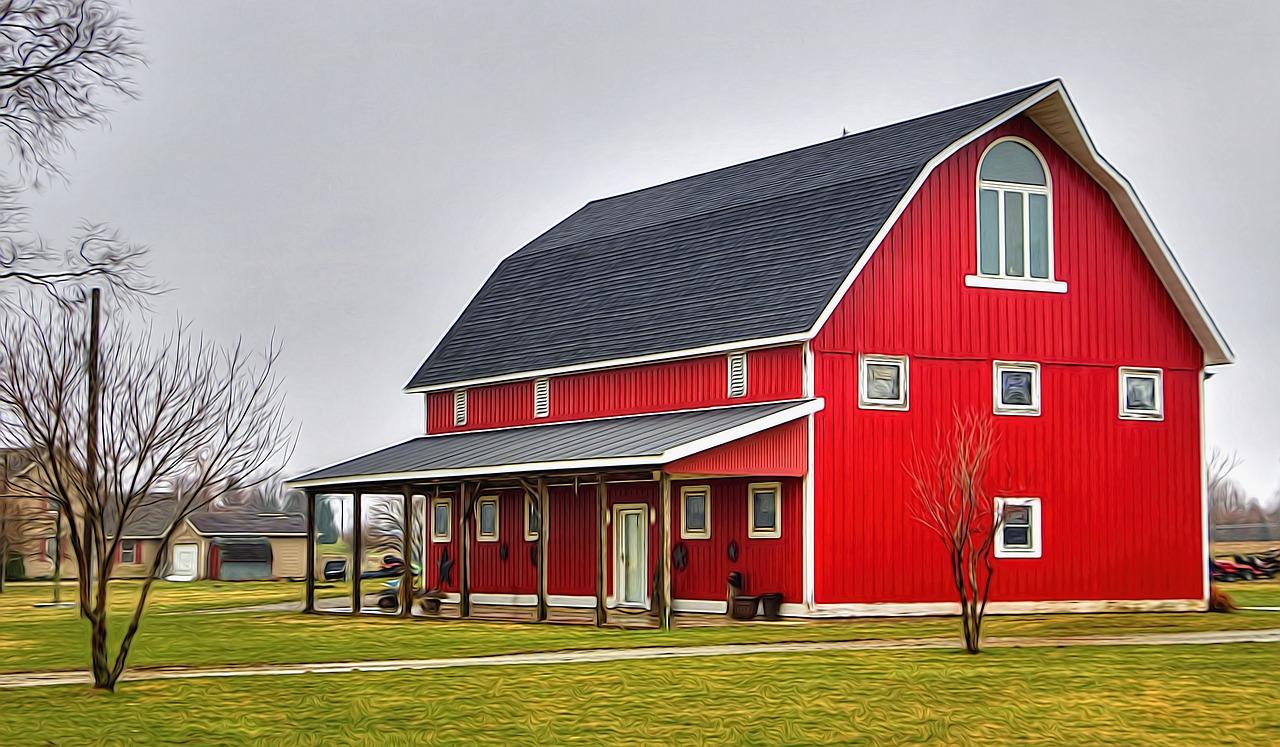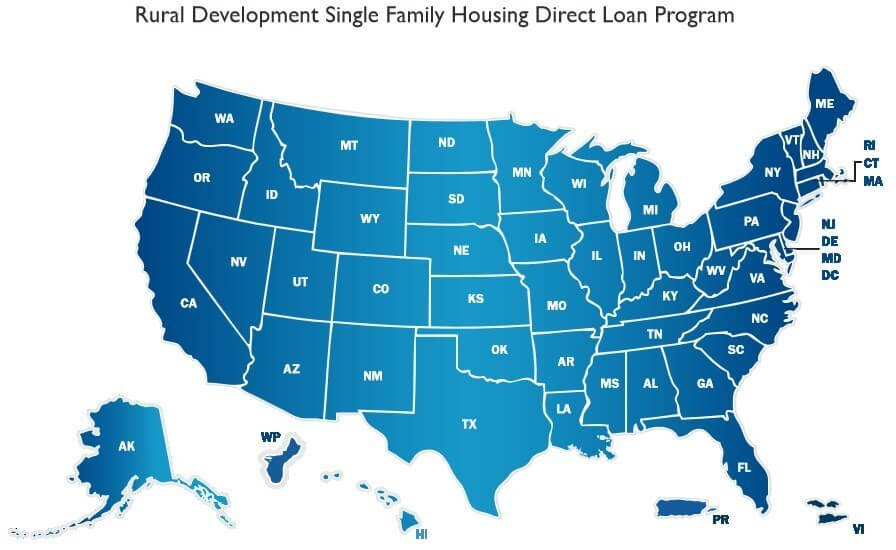Are you looking for an USDA Loan in Texas, but just not sure what a USDA loan even is, how it works, or what it’s even about?
Well looks like you’re in luck today.
We are one of Texas’s leading USDA lenders that specialize in providing FREE USDA mortgage advice and information to folks looking to learn more about how USDA loans work.
Whether you are looking to learn more about how much you can get approved for or already have a USDA mortgage and need to refinance out of your high interest rate loan, we’re here to help you every step of the way!
Checking USDA home loan eligibility is fast, 100% free, and takes less than 30 seconds!
We don’t check credit or need your social security number in order to get started.
How Can a USDA Loan Help You?
If you are someone looking to buy a home but do not have the minimum down payment requirement with other types of mortgages out there, then a Texas USDA home loan may be for you.
USDA loans in Texas are offered to help lower to moderate income households purchase homes in rural areas and in some cases on the outskirts of a city or in a medium sized town as determined by the United States Department of Agriculture (USDA) with no down-payment needed!
In Texas, a USDA loan offers many advantages to qualified borrowers looking to buy or refinance (no cash out) including:
- 100% financing
- Very small monthly mortgage insurance
- No asset requirements
- Gifts allowed for closing costs
- Required property improvements can be financed into the loan up to 102% of the “improved” value, which can be completed after closing.
We offer amazingly low USDA interest rates and competitive closing costs when it comes to helping you buy a home that keeps things easy on the wallet.
We look forward to answering all your questions and are here for you every step of the way.
USDA/FDA Loans

We specialize in servicing first time home buyers looking for a USDA mortgage loan in Texas. A USDA mortgage offers many advantages, as it is very popular with first time homeowners, so you should expect lower interest rates and no down payment in relation to a conventional residential home loan.
In 2025, owning a home is a huge responsibility which shouldn’t be taken lightly when you’re looking at FDA loans. There is a lot to learn before you dive right in, although the first step is often to get approved for FDA home loans. People who have taken mortgage in the past have contributed their knowledge to this article so you can learn how to avoid the mistakes they’ve made, so read on about the rural development direct loan program.
100% Financing
USDA loans may be for up to 100 percent (102 percent if the guarantee fee is included in the loan) of whatever the home appraises for. With this no down-payment option, USDA loans have become a very popular option for those that do not have enough saved up for other types of mortgage financing that is required.
Low, Fixed Rates
USDA mortgages come in one size only – fixed rates. The rates are the same or even better as if you were putting 20% down on the home.
Funds for Closing
Another great feature that comes along with USDA financing is that you can roll everything into the loan. This means you can include closing costs, the guarantee fee, title service fees, and other prepaid items, as long as the appraised value is higher than sales price. The way this is done is by having the sellers raising the sales price by a certain percentage, and then giving it back to you to help contribute to your closing costs.
Occupancy
USDA home loans are only for primary residences. All buyers must personally occupy the dwelling following the purchase.
Refinance Options
If you are wanting to refinance into a USDA loan, you must have an existing USDA Rural Development Guaranteed housing loans or our Section 502 Direct housing loans already in place. For example, you cannot refinance into a USDA loan if you currently have an FHA loan.
Guarantee Fee
There is a one-time guarantee fee that is charged to the lender, which in turn, is rolled into the loan. This is what is called the USDA Guarantee fee and what helps keep USDA in business and offering this great program.
If you are looking for an Austin USDA Lender, Houston USDA Lender, Dallas USDA Lender, or San Antonio USDA Lender, you have come to the right place!
USDA Loan Limits 2025
These are the loan limits for the USDA direct program. Please keep in mind that these are if you go with USDA directly, but if you go with a USDA approved lender such as us, these limits are much much higher because the lender is assuming the risk instead of USDA themselves.
To put things in perspective, USDA lenders like us can do loan amounts over $400,000 whereas if you decide to go with the USDA direct mortgage loan program, you will be capped at these limits below.
Here are all the counties and cities sorted out for you nice and neatly.
| Texas County | USDA Loan Limits 2025 |
|---|---|
| Anderson County, Texas | $104,400 |
| Andrews, Texas | $110,500 |
| Angelina County, TX | $124,200 |
| Aransas County | $134,100 |
| Archer County, TX | $133,200 |
| Armstrong County | $121,900 |
| Atascosa County | $142,300 |
| Austin County, TX | $147,600 |
| Bailey, Texas | $129,000 |
| Bandera County, TX | $131,600 |
| Bastrop County, TX | $144,500 |
| Baylor County, TX | $125,800 |
| Bee County | $128,100 |
| Bell County, TX | $111,500 |
| Bexar County | $143,500 |
| Blanco County, TX | $137,300 |
| Borden, Texas | $110,500 |
| Bosque County, TX | $125,200 |
| Bowie County | $134,300 |
| Brazoria County | $134,000 |
| Brazos County, TX | $162,500 |
| Brewster County TX | $135,200 |
| Briscoe County | $124,200 |
| Brooks County, TX | $121,300 |
| Brown County, TX | $118,800 |
| Burleson County, TX | $140,800 |
| Burnet County, TX | $117,500 |
| Caldwell County | $149,700 |
| Calhoun | $132,000 |
| Callahan County, TX | $121,000 |
| Cameron County | $133,900 |
| Camp County | $131,300 |
| Carson County | $127,400 |
| Cass County | $131,300 |
| Castro County | $116,900 |
| Chambers County, TX | $138,000 |
| Cherokee | $130,200 |
| Childress County | $127,200 |
| Clay County, Texas | $122,300 |
| Cochran, Texas | $129,000 |
| Coke County, TX | $118,600 |
| Coleman County, TX | $115,800 |
| Collin County, TX | $146,700 |
| Collingsworth County | $116,900 |
| Colorado County, TX | $140,300 |
| Comal County | $162,500 |
| Comanche County, TX | $118,300 |
| Concho County, TX | $129,200 |
| Cooke County, TX | $135,700 |
| Coryell Co, TX | $128,500 |
| Cottle, Texas | $114,700 |
| Crane County TX | $126,600 |
| Crockett County TX | $129,200 |
| Crosby, Texas | $129,000 |
| Culberson County | $136,100 |
| Dallam County | $120,900 |
| Dallas County, TX | $134,300 |
| Dawson, Texas | $114,700 |
| Deaf Smith County | $123,900 |
| Delta County | $128,800 |
| Denton County, TX | $135,200 |
| DeWitt | $132,000 |
| Dickens, Texas | $129,000 |
| Dimmit County, TX | $146,500 |
| Donley County | $122,200 |
| Duval County | $121,700 |
| Eastland County, TX | $131,700 |
| Ector County TX | $141,600 |
| Edwards County, TX | $115,900 |
| Ellis County | $143,000 |
| El Paso | $113,000 |
| Erath County | $133,000 |
| Falls County, Texas | $103,500 |
| Fannin County, TX | $128,300 |
| Fayette County, TX | $138,400 |
| Fisher County, TX | $121,000 |
| Floyd, Texas | $129,000 |
| Foard County, TX | $123,200 |
| Fort Bend County | $136,000 |
| Franklin County | $129,300 |
| Freestone County, Texas | $104,400 |
| Frio County | $121,700 |
| Gaines, Texas | $114,700 |
| Galveston County | $131,000 |
| Garza, Texas | $129,000 |
| Gillespie County, TX | $166,000 |
| Glassock County TX | $130,600 |
| Goliad | $132,000 |
| Gonzales County | $138,800 |
| Gray County | $128,400 |
| Grayson County TX | $139,400 |
| Gregg | $135,300 |
| Grimes County | $134,200 |
| Guadalupe County | $150,900 |
| Hale, Texas | $132,800 |
| Hall County | $122,200 |
| Hamilton County, TX | $105,700 |
| Hansford County | $119,400 |
| Hardeman County, TX | $123,200 |
| Hardin County, TX | $128,000 |
| Harris County, TX | $167,900 |
| Harrison | $133,600 |
| Hartley County, TX | $129,400 |
| Haskell County, TX | $121,400 |
| Hays County | $149,700 |
| Hemphill County, TX | $131,400 |
| Henderson County | $129,200 |
| Hidalgo County, TX | $132,600 |
| Hill County, TX | $125,200 |
| Hockley, Texas | $129,000 |
| Hood County | $143,000 |
| Hopkins County | $132,300 |
| Houston County, TX | $139,700 |
| Howard, Texas | $114,700 |
| Hudspeth County | $137,900 |
| Hunt County TX | $137,600 |
| Hutchinson County, TX | $122,900 |
| Irion County, TX | $129,200 |
| Jack County, TX | $122,300 |
| Jackson | $132,000 |
| Jasper County, TX | $105,700 |
| Jeff Davis County TX | $141,100 |
| Jefferson County, TX | $129,000 |
| Jim Hogg County, TX | $121,300 |
| Jim Wells County | $130,600 |
| Johnson County | $143,000 |
| Jones County, TX | $122,000 |
| Karnes County | $144,000 |
| Kaufman County | $139,800 |
| Kendall County, TX | $181,400 |
| Kenedy County | $100,700 |
| Kent County, TX | $120,400 |
| Kerr County, TX | $132,400 |
| Kimble County, TX | $128,300 |
| King, Texas | $129,000 |
| Kinney County, TX | $115,900 |
| Kleberg County | $130,600 |
| Knox County, TX | $121,400 |
| Lamar County | $132,300 |
| Lamb, Texas | $132,800 |
| Lampasas County, TX | $110,400 |
| La Salle County | $132,800 |
| Lavaca | $132,000 |
| Lee County, TX | $140,000 |
| Leon County, TX | $143,200 |
| Liberty County, TX | $145,500 |
| Limestone County, Texas | $104,400 |
| Lipscomb County, TX | $116,600 |
| Live Oak County | $121,700 |
| Llano County, TX | $129,300 |
| Loving County TX | $120,900 |
| Lubbock, Texas | $129,000 |
| Lynn, Texas | $129,000 |
| McCulloch County, TX | $127,700 |
| McLennan County, TX | $134,300 |
| McMullen County | $115,800 |
| Madison County, TX | $143,200 |
| Marion | $130,700 |
| Martin, Texas | $110,500 |
| Mason County, TX | $128,300 |
| Matagorda | $133,900 |
| Maverick County, TX | $145,100 |
| Medina County, TX | $133,300 |
| Menard County, TX | $124,300 |
| Midland County TX | $140,600 |
| Milam County, TX | $105,500 |
| Mills County, TX | $103,200 |
| Mitchell County, TX | $122,900 |
| Montague County, TX | $146,600 |
| Montgomery County, TX | $161,500 |
| Moore County, TX | $136,900 |
| Morris County | $131,300 |
| Motley, Texas | $129,000 |
| Nacogdoches County, TX | $124,200 |
| Navarro County, Texas | $134,300 |
| Newton County, TX | $102,600 |
| Nolan County, TX | $122,400 |
| Nueces County, TX | $130,600 |
| Ochiltree County | $131,400 |
| Oldham County | $131,900 |
| Orange County, TX | $129,000 |
| Palo Pinto County, TX | $133,000 |
| Panola | $129,800 |
| Parker County, TX | $143,000 |
| Parmer County | $119,400 |
| Pecos County TX | $135,600 |
| Polk County, TX | $105,700 |
| Potter County, MSA | $153,600 |
| Presidio County TX | $140,900 |
| Rains County | $137,600 |
| Randall County MSA | $153,600 |
| Reagan County TX | $129,200 |
| Real County, TX | $115,900 |
| Red River County | $128,800 |
| Reeves County TX | $126,600 |
| Refugio County | $130,000 |
| Roberts County | $120,600 |
| Robertson County | $128,500 |
| Rockwall County | $152,700 |
| Runnels County, TX | $118,600 |
| Rusk | $136,500 |
| Sabine County, TX | $102,600 |
| San Augustine County, TX | $102,600 |
| San Jacinto County, TX | $141,500 |
| San Patricio County, TX | $141,500 |
| San Saba County, TX | $104,700 |
| Schleicher County, TX | $127,700 |
| Scurry County, TX | $123,400 |
| Shackelford County, TX | $121,000 |
| Shelby County, TX | $102,600 |
| Sherman County | $121,900 |
| Smith County | $135,900 |
| Somervell County | $133,000 |
| Starr County, TX | $130,100 |
| Stephens County, TX | $131,400 |
| Sterling County, TX | $127,700 |
| Stonewall County, TX | $120,400 |
| Sutton County, TX | $127,700 |
| Swisher County | $116,900 |
| Tarrant County | $143,000 |
| Taylor County, TX | $123,400 |
| Terrell County TX | $118,500 |
| Terry, Texas | $129,000 |
| Throckmorton County, TX | $121,400 |
| Titus County | $132,300 |
| Tom Green County, TX | $129,200 |
| Travis County, TX | $144,100 |
| Trinity County, TX | $139,700 |
| Tyler County, TX | $105,700 |
| Upshur | $135,500 |
| Upton County TX | $121,400 |
| Uvalde County, TX | $145,000 |
| Val Verde County, TX | $142,000 |
| Van Zandt County | $130,000 |
| Victoria | $132,000 |
| Walker County, TX | $150,400 |
| Waller County | $151,200 |
| Ward County TX | $139,600 |
| Washington County, TX | $144,500 |
| Webb County | $120,600 |
| Wharton | $132,300 |
| Wheeler County | $120,500 |
| Wichita County, TX | $135,700 |
| Wilbarger County, TX | $125,800 |
| Willacy County | $130,300 |
| Williamson County, TX | $144,100 |
| Wilson County | $155,000 |
| Winkler County TX | $124,600 |
| Wise County, TX | $146,600 |
| Wood | $139,600 |
| Yoakum, Texas | $129,000 |
| Young County, TX | $135,700 |
| Zapata | $125,800 |
| Zavala County, TX | $141,800 |
Hire an attorney to help you understand your USDA loan income limits and property limits. Even those with degrees in accounting can find it difficult to fully understand the terms of a mortgage loan and the different types of rural development income limits, and just trusting someone’s word on what everything means can cause you problems down the line. Get an attorney to look it over and make everything clear on the USDA loan limits.

USDA First Time Home Buyer
A rural development loan is just another way of saying USDA mortgage. Both are in fact the exact same thing but different lenders use this terminology instead.
USDA home loans for rural housing are designed to keep agricultural areas in the United States strong by giving people in the communities the same opportunity to own homes even though there may be less homes in these USDA areas.
Our USDA loan experts will walk you through the process of obtaining a USDA loan in Texas, step-by-step.
With a USDA Loan you can:
- Purchase or refinance a home.
- Avoid high private mortgage insurance (PMI) like other loan programs.
- Avoid needing money for a down payment
- Get lower, fixed interest rates
- Save money and refinance an existing USDA loan into a lower fixed rate
And because it’s a USDA loan, lenders will offer you lower, more affordable rates. Even if you have less-than-perfect credit or are a first time home buyer a USDA loan could be the right loan for you.
Purpose
The USDA Rural Development Loan program is made to ensure that individuals of rural communities can compete in the global economy. This will allow for rural communities to build better community centers and facilities thus attracting more people to move to those neighborhoods. These loans are attractive to those who have stable income and credit, but don’t have enough money for down payment.
Benefit
Traditional mortgage loans can be more challenging for these types of buyers because they require a down payment and are unable to have a guarantee that the loan will be paid. USDA home mortgage loans on the other hand are insured and guaranteed by the government.
Protection
Under the Guaranteed Loan Program, the Housing and Community Facilities Program guarantees and insures loans made by lenders such as ourselves. In addition, an individual or family may borrow up to 100% of the appraised value of the home, which eliminates the need for a down payment.
Location
Not only people living in rural areas qualify. Those living in the outskirts of a city or in a medium sized town may also qualify. Find out if you qualify for a USDA home mortgage loan by asking questions without any obligations.
Outlook
USDA loans Texas are primarily designed to help low income individuals and households to purchase a home in rural areas. These loans do not require a down payment but do have income and property limitations.
If you are planning on purchasing a house and are a USDA first time home buyer, make sure your credit is in good standing. Most lenders want to make sure your credit history has been spotless for at least a year if you’re looking to get approved for a USDA first time home buyer loan. To obtain amazing rates for a USDA first time home buyer program, your credit score should be at least 600. Remember that the lower your score is, the harder the chances of getting approved if you are a first time home buyer USDA.
In addition to that, you can also take advantage of the USDA first time home buyer grant which helps.
USDA Refinance

If you are looking to refinance and want the best rate and terms, and want an easy process with more favorable guidelines, a USDA loan is probably the best choice for you.
USDA refinances are for rate and term refinance loans (no cash out allowed). The original loan must be a Guaranteed Rural Housing Loan.
USDA fixed rate loans are one of the most popular programs for refinancing. This is where you have stable predicable payments each month and as a result offers the most security for yourself and your family. If you are currently in an adjustable rate mortgage (ARM) and would like the security of a fixed rate, a fixed rate USDA is the right program for you.
Refinancing Your USDA Loan
Refinancing into a USDA loan is a very similar process to refinancing using conventional financing.
In fact, both loans require almost identical paperwork, it’s just that a USDA mortgage is only another type of loan.
That whole process generally takes no more than 30 days.
One nice advantage of refinancing is that you are allowed to skip one month of your mortgage payment after you close.
Depending on when in the month your mortgage closes you can possibly not make the current mortgage payment and skip the following month as well. You can use this money to pay off another bill, fix up your home, or even go on vacation.
When it comes to refinancing your current Texas USDA mortgage, we make the process simple by giving you straight forward advice because we know that this will enable you to make the most accurate financial decision.
Check out the interest rates for 30, 15 and 20 year term lengths if looking for a USDA refinance. Many times the shorter the term length the lower the interest rate. Although you may think you payment will be higher on a shorter term loan on perhaps double wide financing, you can actually save money on your payment by choosing a lower interest rate and a shorter term on the USDA streamline refinance.
USDA Mortgage Insurance
Although using money given to you as a gift from relatives for your down payment is legal, make sure to document that the money is a gift. The lending institution may require a written statement from the documentation and donor about when the deposit to your bank account was made. Have this documentation ready for your lender if you’re looking for a home loans direct.
USDA Underwriting Guidelines

To be eligible, applicants must:
- Have an adequate and dependable income.
- Be a U.S. citizen, qualified alien, or be legally admitted to the United States for permanent residence.
- Have an adjusted annual household income that does not exceed the moderate income limit established for the area. A family’s income includes the total gross income of the applicant, co-applicant and any other adults in the household. Applicants may be eligible to make certain adjustments to gross income— such as annual child care expenses and $480 for each minor child—in order to qualify. Here is an automated USDA income eligibility calculator for USDA to help out.
- Have a credit history that indicates a reasonable willingness to meet obligations as they become due.
- Have repayment ability based on the following ratios: total monthly obligations / gross monthly income cannot exceed 41%.
When comparing USDA direct vs guaranteed loans in 2025 and before giving personal information to any lender, check with your local Better Business Bureau. Unfortunately, there are predatory lenders out there that are only out to steal your identity. By checking with your BBB, you can ensure that you are only giving your information to a legitimate home mortgage lender.
USDA Property Eligibility

Considering a home purchase in Texas but unsure about the down payment? The USDA Home Loan program, backed by the U.S. Department of Agriculture, offers a unique opportunity for 100% financing in eligible areas.
You might be surprised to learn that many areas outside major cities, and even some suburban neighborhoods, qualify for USDA financing. This program aims to strengthen rural and suburban communities by making homeownership more accessible.
As a leading Texas USDA loan specialist, we provide expert guidance and clear information to help you understand the program, determine your eligibility, and navigate the home-buying process with confidence.
Why Choose Us for Your Texas USDA Loan?
- Competitive USDA Rates: Our established relationships with investors allow us to offer competitive interest rates, saving you money on your loan.
- Expert Guidance: Buying or refinancing a home can seem complex. Our specialists focus solely on USDA loans, ensuring you receive knowledgeable advice every step of the way.
- Streamlined Process: We utilize secure e-sign technology for a convenient and efficient application process, letting you get started quickly.
Check Your USDA Eligibility – Fast & Free
Find out if you might qualify in under 30 seconds. No credit check or Social Security number is required to start. [Check Eligibility Now Button]
What is a USDA Home Loan?
The USDA Rural Development Guaranteed Housing Loan Program is designed to help low-to-moderate-income households purchase homes in designated rural and suburban areas. If saving for a down payment is a challenge, a USDA loan could be the perfect solution.
Key Benefits of a Texas USDA Loan:
- 100% Financing: No down payment is required in most cases.
- Competitive Fixed Interest Rates: Enjoy predictable monthly payments with rates often comparable to conventional loans requiring significant down payments.
- Flexible Credit Guidelines: While good credit is beneficial, USDA guidelines can be more flexible than other loan types.
- Ability to Finance Closing Costs: In some situations where the home appraises for more than the sales price, closing costs can be rolled into the loan amount.
- Finance Necessary Improvements: Required property improvements (up to 102% of the “improved” value) can potentially be financed into the loan.
- Reduced Mortgage Insurance Costs: USDA loans feature a one-time guarantee fee (can often be financed) and a low annual fee, typically lower than Private Mortgage Insurance (PMI) on conventional loans or FHA mortgage insurance premiums.
- Gifts Allowed: Gift funds from family or eligible sources can be used towards closing costs (proper documentation required).
USDA Loan Eligibility Basics:
Borrower Requirements:
- Income: Household income must meet USDA limits for the specific county (we can help you verify this). Income must be stable and dependable. Use the [USDA Income Eligibility Calculator Link] as a starting point.
- Citizenship: Must be a U.S. citizen, qualified alien, or legally admitted for permanent residence.
- Credit: A reasonable credit history demonstrating a willingness to meet financial obligations is required. A credit score of 640+ is generally preferred for streamlined processing, but applications with lower scores may be considered with compensating factors.
- Repayment Ability: Your total monthly debt obligations (including the proposed mortgage payment) generally cannot exceed 41% of your gross monthly income (Debt-to-Income ratio).
Property Requirements:
- Location: The home must be located in a USDA-eligible rural or suburban area. [USDA Property Eligibility Map Link] You might be surprised which areas qualify – always check with us!
- Property Type: Must be a primary residence. Eligible properties typically include single-family homes and approved condominiums.
- Condition: The home must be structurally sound, functionally adequate, and in good repair.
- No Income Production: The property cannot be used for income-producing activities (e.g., a working farm).
Understanding USDA Loan Limits (Guaranteed Program)
The USDA Direct Loan program (administered directly by USDA) has strict loan limits. However, the USDA Guaranteed Loan Program, which is offered through approved lenders like us, does not have a maximum loan amount set by USDA. Instead, the loan amount is determined by the borrower’s repayment ability and the property’s value. We regularly process USDA loans significantly higher than the Direct program limits, often exceeding $400,000 based on borrower qualifications.
USDA Refinance Program
Already have a USDA loan? You may be eligible to refinance into a lower interest rate with the USDA Streamline Refinance program. This option offers simplified documentation and potentially no new appraisal.
- Eligibility: Must currently have a USDA Guaranteed or Direct loan. Refinance is for rate-and-term changes only (no cash out).
- Benefits: Potentially lower your monthly payment and the total interest paid over the life of the loan.
The USDA Loan Process with Us:
- Eligibility Check: Start with our quick online tool or contact us directly.
- Pre-Approval: We’ll review your income, credit, and financial details to determine your potential loan amount.
- Application: Complete the formal loan application using our secure online portal.
- Processing & Underwriting: We gather necessary documentation (pay stubs, bank statements, etc.) and submit your file for USDA review and approval.
- Appraisal: An independent appraisal is ordered to confirm the property’s value and condition meet USDA standards.
- Closing: Once final approval is received, you’ll sign the closing documents, and the keys to your new home are yours!
Using Gift Funds:
If you receive gift funds from eligible donors (like family) to help with closing costs, ensure you have clear documentation. This typically involves a gift letter from the donor confirming the funds are a gift and not a loan, along with proof of the funds transfer. We can guide you on the specific documentation needed.
Understanding Your Loan Estimate and Closing Costs:
Once you apply and provide necessary information, you’ll receive a Loan Estimate (LE). This standardized document outlines the estimated costs associated with your loan, including lender fees, third-party charges (like appraisal and title insurance), and pre-paid items (like property taxes and homeowner’s insurance). We are committed to transparency and will walk you through your LE to ensure you understand all associated costs before closing.
Escrow for Taxes and Insurance:
Most mortgages, including USDA loans, utilize an escrow account. A portion of your monthly payment goes into this account, and we use these funds to pay your property taxes and homeowner’s insurance premiums on your behalf when they are due. This ensures these important bills are paid on time.
USDA Mortgage Calculator
Estimate your potential monthly payment, including principal, interest, taxes, insurance, and the USDA annual fee, using our specialized calculator. [Access the USDA Loan Calculator Link/Button]
Today’s USDA Loan Rates
Mortgage rates fluctuate based on market conditions. For the most current Texas USDA loan rates and a personalized quote based on your scenario, please contact us or request a quote online. [Get a Personalized Rate Quote Link/Button]
Ready to Take the Next Step?
Whether you’re a first-time homebuyer or looking to refinance your existing USDA loan, we’re here to help make the process smooth and understandable. Our Texas-based USDA loan experts are ready to answer your questions and guide you toward achieving your homeownership goals.
“Zavala County, TX $141,800. Hire an attorney to help you understand your USDA loan income limits and property limits. Even those with degrees in accounting can find it difficult to fully”
